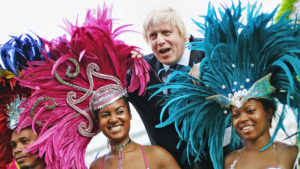In August 2022, English teacher Kirsty Pole took to Twitter to warn other teachers about a former kickboxer and Big Brother contestant who was “spouting dangerous, misogynistic and homophobic abuse” online.
The culprit was, of course, Andrew Tate. Pole was especially worried about his appeal to younger boys. As she told Sky News: “They already don’t know who they should be, if they’re allowed emotions, if they’re allowed to cry or if they need to ‘man up’.”
Tate has certainly made an impression. You will struggle to find a boy or young man who doesn’t know who he is, except perhaps among the Amish. My own 20-year-old son told me at the start of this year that I needed to examine Tate’s success, just as I was finishing up my book on boys and men.
I ignored my son’s advice, but he was right. Tate has since become a global influencer: there have been more Google searches in recent months for “Andrew Tate” than for “recession”. Six years after being kicked off Big Brother for hitting a woman with a belt (she later claimed consensually), he is now considered such a danger to society that he has been banned from almost every social media platform. Twitter suspended him in 2017, after he said that women should “bear some responsibility” for being raped, and TikTok, Instagram and YouTube have followed suit.
That hasn’t stopped Tate’s followers flooding the internet with his content. Videos of Andrew Tate have been viewed more than 12 billion times on TikTok, and more than 100,000 people have signed up to his £39-per-month online academy ‘Hustler’s University’. His videos contain a mix of extreme misogyny, with women referred to as “bitches” and “property”; irresponsible mental health messaging, including that depression “isn’t real”; along with some sound basic advice, such as the need to do the hard things in life even when you don’t feel like it.
Tate himself says: “I am simply saying things that many men think, believe and feel.” I’m not sure that this is true. It’s unlikely that most his viewers are so passionately anti-feminist. But simply dismissing Tate as a misogynist or an opportunist is not good enough, even though he is both. His appeal should instead be seen as a leading indicator of some of the genuine disorientation being felt by millions of boys and men.
This male malaise is real. The symptoms can be seen in school, in the workplace and in family life. Boys have fallen far behind girls in the classroom and on college campuses. Male wages have yet to recover from the Great Recession, and men in their twenties now earn slightly less, on average, than women of the same age. In two out of five couples, the woman earns as much or more than the man. A million children are growing up without any relationship with their father. The resulting “Dad Deprivation”, as Warren Farrell, author of The Boy Crisis, puts it, has clear negative effects on education, crime, health, and employment for children — especially boys.
Many of these trends are the result of the extraordinary successes of the women’s movement. The educational, economic, and cultural rise of women represents perhaps the greatest liberation of the modern age. It is one we should rightly celebrate. But it does prompt the question: what about the men?
Without the clear direction and social incentives of the old provider-protector model of manhood, many men are left rudderless, underpowered, drifting. Why do men account for only 30% of the young people who sign up for Voluntary Service Overseas? Why are 43% of 25-year-old men still living with their parents, compared to just 25% of women of the same age? Why is suicide the biggest killer of British men under the age of 45?
Kirsty Pole’s comment about why boys might be drawn to Tate was absolutely right: “They don’t know who they should be.” Tate has no such doubts. He projects masculine strength, confidence, and independence. A former kickboxer, tanned and muscular, he conducts many of his interviews shirtless. Tate’s unapologetic, unvarnished masculinity is a vivid contrast to the tepid “social and emotional learning” classes that most boys are subjected to, where, if masculinity is discussed at all, it will be of the toxic variety. There are too many wagging fingers, not enough helping hands.
Interviewing dozens of adolescent boys and young men for her book Boys and Sex, Peggy Orenstein always asked them what they liked about being a boy. She says most drew a blank. “That’s interesting,” said one college student. “I never really thought about that. You hear a lot more about what is wrong with guys.”
If broader society does not have a positive story to tell boys and young men about who they should be, we should not be surprised by the appeal of people like Andrew Tate, who does. In this sense Tate is a successor to Jordan Peterson, the Canadian psychologist. His 2018 book, 12 Rules for Life, sold more than 5 million copies. When Peterson goes on a book tour, he packs venues like the O2 centre or Wembley Stadium. By Peterson’s own reckoning, young men account for 80% of his readers and audiences.
I see Peterson as a giant listening ear, towards which millions of men have flocked. And I expect many liberals will look more kindly on Peterson now that Andrew Tate has burst onto the scene, just as they got all dewy-eyed for the once-hated George W. Bush during the presidency of Donald Trump. Peterson has offered some opinions that many progressives find objectionable, but he’s milquetoast by comparison to Tate. What’s driving the popularity of Peterson and Tate, as well as other figures like the podcaster Joe Rogan, however, is the same thing: a desperate need for some positive, male-specific guidance, which is now missing in mainstream culture.
We have torn up the old script for femininity, restricted to marriage and motherhood, and replaced it with a new expansive, empowering script for girls and women: you can be anything you want to be, from stay-at-home mother to Prime Minister and everything in between. We have also torn up the old script for masculinity, based on providing for and protecting women and children. But we haven’t replaced it with a new, positive masculine script. That has created a dangerous cultural vacuum, one that figures like Andrew Tate are only too happy to fill.
Tate is providing, or rather performing, a script for masculinity. But it’s not a new one, or a particularly positive one in general, and it certainly won’t work in a world of gender equality. Most of the men watching his videos know this to be the case. But where else are they supposed to look? If we don’t like Tate’s script, we need to provide a better one, rather than simply railing against theirs.
It is a fact of human history that mature masculinity is more socially constructed than femininity. The idea of a crisis of femininity is hard to imagine, since the process of bearing, giving birth to, and feeding children is a strong component of feminine identity that is hard to disrupt. The role of men in reproduction is obviously less direct, and so the rites of passage to mature masculinity are less grounded in biology than in culture. As the anthropologist Margaret Mead wrote: “Every known human society rests firmly on the learned nurturing behaviour of men.” But as she warned: “This behaviour, being learned, is fragile, and can disappear rather easily under social conditions that no longer teach it effectively.”
The cultural task of helping growing boys to become good men can’t be neglected. A new script for prosocial masculinity can celebrate some of the natural traits that occur more often in boys and men, such as physical courage and an appetite for risk. The fact that men are more likely to sacrifice their lives to save others is not, thankfully, of everyday relevance: but when it happens, we should be careful to honour it appropriately. Likewise, if men are, on average, more willing to take risks in the service of exploration or profit, the benefits should be celebrated. A positive script for masculinity ought also to highlight the vital role of fathers as providers not only of material goods, but of care, teaching, and mentorship. It should also validate the greater interest of boys and men on average on “things” rather than “people”, for example in technology or engineering.
It requires a recognition that men and women are in fact different, and that neither is intrinsically superior to the other: “The Future is Female” is not a good rallying cry, at least for boys and men. But of course this new script for masculinity has to be compatible with gender equality. We cannot rescue men by repressing women.
Masculinity needs a script. The only question is who is writing it. If we don’t want it to be Tate, it has to be mainstream institutions and culture. As Daniel Schwammenthal, director of the American Jewish Committee’s Transatlantic Institute, says: “The iron rule of politics is that if there are real problems in society and responsible parties don’t deal with them, the irresponsible parties will jump on them.” It is time for mainstream institutions to deal with this crisis of masculinity directly. If not, when we are looking for someone to blame for the rise of Andrew Tate, we might have to look in the mirror.
Disclaimer
Some of the posts we share are controversial and we do not necessarily agree with them in the whole extend. Sometimes we agree with the content or part of it but we do not agree with the narration or language. Nevertheless we find them somehow interesting, valuable and/or informative or we share them, because we strongly believe in freedom of speech, free press and journalism. We strongly encourage you to have a critical approach to all the content, do your own research and analysis to build your own opinion.
We would be glad to have your feedback.
Source: UnHerd Read the original article here: https://unherd.com/




